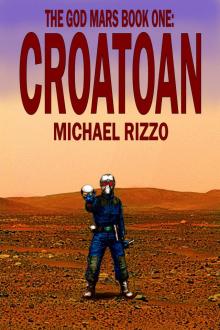- Home
- Michael Rizzo
The God Mars Book Two: Lost Worlds Page 5
The God Mars Book Two: Lost Worlds Read online
Page 5
“I hope this helps,” Richards’ voice comes back over the constantly changing video feed. “But I also need to put this all in perspective. You’ve given us quite a shock. The public cheer you see is huge—don’t mistake that—but it is far from all of it. You have also hit us with a great deal of guilt and shame for leaving you all behind. What this should do in a perfect world is motivate the powers that be into lifting the quarantine and sending every resource to your aid, but things are more complicated than that.”
He pauses to gather himself.
“I’m sending you some files we’ve put together for you. I’m not a historian or sociologist, and only passable as a speaker, so bear with me please. When the disaster in 2065 happened, it happened on both planets. Even before the Discs killed our incoming ships and crippled our orbital resources, we were reeling as a planet from what had happened on Mars. It destroyed us. Personally, socially, politically, economically… The impact was beyond anything we could imagine. The grief, the horror, the rage… We had watched what we thought to be tens of thousands of people wiped out by our own machinations. And once we finished blaming the Discs and the Shield and the politicians and the activist groups and the corporations, it all came back to all of us: our desires for longer life and better toys had created this monster that turned on us. And we all changed in those years.
“You won’t recognize us now, just as we may not interface well with you anymore. You are from are different world, a different time. We purged so much… Maybe foolishly, blindly… But we are now what we are because of that. You will see in the reports… We turned on the corporations, the material culture… You once fought a war against religious extremists who wanted the world made simpler, purer. We are now perhaps more like those former enemies than you would like.”
He stops the images, lets us focus on him. He looks like he’s struggling to find direction, words.
“It isn’t at all bad, Colonel. I can say this because I was close with my grandfather Thomas—I feel as if I know you, what you went through to try to keep this world from killing itself over ideals. You didn’t lose—this isn’t a Muslim theocracy, or a Christian one… isn’t a theocracy at all… but there is less separation now because we turned to the spiritual, looked to our better natures, to forgive and let go of what had poisoned us…
“We’re not cavemen, not superstitious primitives, not Luddites… We held on to what was useful. We did not stop progress, research. It’s just that we proceed more thoughtfully now. You have met Dr. Chandry: UNCORT is an international accord to regulate technological research and development, much like the weapons and environmental compacts of your time. There are places that we have agreed never to go again: No self-replicating or adaptive nanotechnology, no DNA manipulation, limits on AI and bio-research—Dr. Chandry can give you the specifics of the global legislation. But larger than that: we no longer allow the markets to drive our production any more than we let economics impact the environment. You might like this world of ours: It’s cleaner, healthier, less focused on material comfort and wealth as power. There is less conflict, less famine. The population has stabilized at ten billion. We still have babies the old fashioned way and live about as long as when you were here last. And we still die of the same things—even though we had the technology in our hands to resist death, we will not allow our bodies to be so violated. I do believe we are the better because of the lessons we learned when we thought we lost all of you.”
He pauses to give us what he looks like he hopes is a reassuring smile, something almost paternal (though like a father who has been absent many years trying to explain the reasons for his abandonment).
“The revolution did destroy the corporations that funded the colonies, and crippled the governments that relied on those economies. We had a lot of rebuilding to do after that, and we focused on what we all agreed was most important: living better, not greedier. Quality over quantity. Appreciating the simple things. Nurturing our planet and ourselves.
“I’m sorry to say what we didn’t rebuild was our space programs. This will mean delays in getting to you—we are scrambling now to refit some ships we’d left in mothballs, to revive the industries that built rockets and shuttles and orbital docks. But it will likely take years—perhaps decades—to restore anything resembling what we had before 2065. We are almost starting from scratch. Simple unmanned probes and supply drops will come to you first, likely within the year, but manned missions… Even if the Quarantine is lifted, expect it will be at least two more years.
“I can tell you two more things at this time: First, because of our bans and the fear of nano-contamination, the researchers at UNCORT are especially concerned with what directions the ETE have taken their technology, no matter what their advancements have yielded positively for the planet and the other survivors. The lifting of the quarantine may rest on this issue. Second, in spite of the Quarantine, I am proud to say there are quite a number of volunteers coming forward who want to be on those first relief missions, even if the quarantine means that their trip will be indefinitely one-way. I have put myself on this list—as I said before, I do look forward to meeting you in person.
“I will say farewell for now. Message ends.”
No one says anything for at least a full minute. Matthew just shakes his head, very slightly. Tru is biting her thumbnail. Lisa’s eyes are locked on me.
I spin in my chair and key up the ETE Link channel. I’m almost surprised by how quickly the blue sealsuit and chrome mask appears on my screen.
“Your call is expected,” Council Blue assures me calmly, “as is its purpose.”
“You’ve been monitoring?” I ask needlessly—just for the social reassurance. The helmet nods—I find this is one time I would especially appreciate seeing Mark Stilson’s face instead of his mask.
“We do not presume to interfere with your duty, Colonel: Send them everything you have about us,” he allows evenly. “When we see how they respond to that, then we will consider whether or not it is time to speak with them ourselves. Know that we appreciate your discretion up to this point. Know also that it is unnecessary. What we have done here is not for you to defend.”
I nod my understanding heavily, and he vanishes.
Then I tell Anton to send the requested files.
“Everything?” he has to ask.
“Everything. Including Halley’s examinations of Paul, our skirmishes with the Nomads, the Shinkyo attacks, the PK and Zodanga incidents…”
“Our training of the ETE ‘Guardians’?” Matthew asks uncomfortably.
“All of it.”
3 February, 2116:
As if we’re being punished for our (my) sins, we don’t get another message (other than pings to reassure us the channel’s still open) for two days.
In the interim, we’ve been pouring through the files sent with the last message:
There are a lot of personnel-specific records, most detailing the fates of the families left behind. I decide not to censor any of it. It’s in many cases more difficult than we could have anticipated. Halley and Ryder have grown grandchildren and great-grandchildren, their children dead years ago. Anton’s parents are also long-deceased, and his “younger” sister has aged poorly—the report from a UNMAC page says she doesn’t seem to remember him at all, much less their conversations about him. He has an adult nephew with children physically older than him.
Morales had a “baby daddy” back home taking care of their young son. The child is now fifty-seven, a new grandparent himself, with half-siblings from his father’s subsequent relationships.
Kastl’s wife remarried in 2069, had the children he never had with her, and accepted “voluntary euthanasia” after being diagnosed with a Stage 4 brain tumor three years ago, surrounded by her children and grandchildren.
Smith’s ex died of a completely curable cancer, having become a post-Apocalypse convert to one of many newly-popular fundamentalist sects that passionately encouraged the rejectio
n of the nano-medicine that could have saved her. (Apparently pumping adaptive self-replicating machines into your body was now an unthinkable taboo.) His two sons were raised by her family. His oldest was killed bringing aid to the starving in East Africa—not by violence; just a senseless convoy accident. His youngest had a family of his own and is still alive—a grandfather—but hasn’t responded to UNMAC attempts to contact him.
As for Rios, only the grandchildren of cousins could be found.
Tru has a similar file: the descendants of a sister and a few cousins, all her age and older, who only knew her in stories and old family picture and video files.
In all, nine-hundred and seventeen of us got mixed news from home, but in only a few cases were there any actual video correspondences from those relatives, and all of those are very brief and awkward. Depressing in a different way are files sent to personnel we’ve lost, including a message from Colonel Copeland’s granddaughter and one from Lieutenant Carver’s nephew.
There is also a very sparse history of the last fifty years. Richards and Satrapi were good to their words in sending us reasonably detailed accounts of the Earthside response to the bombardment and orbital attack, as well as the Disc “Trojan” attack on Earth’s orbital facilities. It isn’t as hard to understand their reluctance to come back for us, especially after reviewing the video files of the Discs using the surviving ships to kill even more of us. Otherwise, what we get feels carefully sanitized (made more suspect by their “securing” of our channels—anything we get comes from a single “official” source).
The global and political map shifted almost as much as the economic one in the wake of the horror. There were demonstrations, riots, revolutions. It looked like the Eco War had come to Earth with a vengeance, as nanotech producers and vendors were attacked globally, labs and plants destroyed, products dumped and burned in raging ceremonies. All space programs were de-funded and defunct by the end of the ‘60s. Several countries completely collapsed into near-anarchy, only to revive years later with new governments and sometimes new names. The so-called superpowers suffered infrastructure catastrophes as food, energy, housing and medicine were impacted by the economic fallout of the decapitation of the chief corporate powers. Unemployment exceeded all other depressions and recessions in history, and urban centers devolved into no-man’s lands while unsustainable suburbia went up in flames. And in the darkness, people turned back to God in unprecedented numbers.
“It looks like the Islamic Fundamentalists got in bed with the Bronze-Age Christian Ultra-Right,” Matthew quips as he’s reviewing the reports. “Fucking Amish-Taliban Disneyland…”
Entire communities shunned all but the most basic tech, vilified consumerism, and turned to farming. Even those lucky enough to still have high tech corporate jobs started shunning them with the support of their communities, further crippling industry, and universities were forced to close career programs in certain sciences.
It became a popular sell among the most vocal new spiritual leaders to try to convince the people that the Mars disaster was punishment for their personal sins. As Richards had said, once they got done with the corporations and the governments, they could only blame themselves in the cycle of supply and demand.
But also like Richards had said, it wasn’t all that extreme, and did have its global benefits. Many political and economic movements took up the Eco cause, popular demand now driving a multinational effort to develop “green” technologies and clean energy, to restore the environment and to take care of each other. (Just considering that since emigration to other planets was no longer a practical or acceptable future, humans would now have to make the best of home.) The downside was that many governments took a strong religious theme in returning to “what’s important.” The unexpected upside was that they were remarkably tolerant about it—though majority monotheist, the ancient differences were mostly set aside in favor of embracing tolerance for “all God’s creation.” Or as Matthew put it, even the radical Muslims were bedding down with the fundamentalist Christians and Jews.
Wars had gotten few, and were usually ameliorated with a global in-pouring of resources—not much to fight over if everybody has enough (and gets very publicly shamed about the sinfulness of wanting more).
As for technology, they had progressed—as Richards put it—“thoughtfully.” They had willingly sacrificed the miraculous benefits of medical nanotech for a shorter, more mortal existence—quality over quantity—taking their time in developing other means, other cures. And without the military or consumer demands that often drove technology to evolve exponentially, what was “cutting edge” back home does not seem so many years ahead of what we had before we all went to sleep.
(Though this isn’t a universal standard: Anton is quick to point out that the Lancer’s technology appears to be more advanced than the current Earth standard, and that means someone is playing with science that would probably incur the ire of UNCORT.)
But what strikes me as most stunning: All during this incredible evolution of humanity, the planet seemed to have managed to almost completely forget about us.
When Richards comes through at 13:05, he looks like he hasn’t slept since the last time he spoke to us.
“We have reviewed your latest reports, Colonel,” he begins like he’s spent two days under live fire. “There is a lot of concern—I can understand your reluctance to send us this intelligence, despite your obligation to duty… This does change things, I’m afraid to say. We’ve kept this classified, of course… But the UNCORT membership is up in arms, and the UNMAC military leadership has expressed great concern with your withholding of this information, as well as your reported complacency with the ETE. There are, frankly, many here that would doubt your fitness to command, Colonel Ram, but we cannot adequately appreciate your situation and have few options. I can only hope that you will trust us and be completely forthcoming from this point on. I would suggest this is in all of your best interests.”
“Fuckers…” I hear Matthew growl under his breath, with that same edge that tells me the old scars are aching again. So are mine.
“Decisions made have been made, for good or ill,” Richards continues. “We can only move forward from here. We need to trust each other, Colonel. I’m taking your last report as a sign that you have dedicated to that, so I’m going to put my faith in you. You have been thrust into an unimaginable situation, and have maintained the survival of your personnel commendably.
“I will give you one directive, Colonel: We need you to find out as much as you can about the survivor factions: Census, structure, resources, technology, placement. I appreciate that this will entail risk, but the more we know, the better we can respond with support, and frankly, the more willing we will be to do so. There are many doubts and fears back here, Colonel. We need to dispel them—to let the people of Earth know what’s going on up there, to let them know what we’d be going back to.
“As for the ETE, you are being encouraged to maintain reasonable diplomatic relations with them in order to ensure continued environmental supports. Know that this decision is not based on any apparent trust you have fostered with them, but simply because we cannot expect you to intervene in the situation effectively with your limited resources. We insist that you not provide them any kind of military support or advisement from this point on. We also insist that—should the opportunity arise—you provide us with more intelligence regarding their technology.”
He looks down, then to the left and right as if needing to consider what he will say in terms of whoever is monitoring and scripting him.
“In this last point, I will tell you that you are not our only source of intelligence.”
An image appears behind him: A thirty-something pale oriental male in a black robe, seated in front of a Shinkyo banner.
“We were contacted after your last transmission by someone identifying himself as Hatsumi Oda, governor-in-exile of the Shinkyo Colony. The signal came from inside Ius Chasma t
o your west. He knew that Dr. Halley’s sampling of ETE biotech would be uselessly inert for analysis, and claims to have several viable samples that he is willing to offer data on. His preliminary reports made quite an unpleasant stir, Colonel. Further, he offered to serve as an onsite source of intelligence gathering and—if necessary—military operations. Given your reports of his people’s apparently questionable motives, we are considering his offers with caution. However, I fully expect Command may consider utilizing them in the foreseeable future.”
He signs off with almost mechanical officiousness. I close my eyes and breathe into my hands. When I look up, Matthew is shaking his head like he’s seething.
“The little hilltop tent-show makes more sense now,” I allow numbly.
“You know, I’ve always thought your average God-Wad type came across as at least a little stupid, if not a lot stupid,” Matthew bleeds off a bit of his built-up venom. “Now we’ve got them running the whole planet. We’re fucked.”
“No hurry to go home, then?” I try to get his humor back.
“I fully get now why you weren’t gung-ho to get the call out,” he gives me, kneading his brow with his fingers.
“Amen,” I hear Rick chime in bitterly over the Link from Candor.
I suddenly need very much to get up and get out of there.

 Grayman Book One: Acts of War
Grayman Book One: Acts of War The God Mars Book One: CROATOAN
The God Mars Book One: CROATOAN The God Mars Book Six: Valhalla I Am Coming
The God Mars Book Six: Valhalla I Am Coming The God Mars Book Five: Onryo
The God Mars Book Five: Onryo The God Mars Book Four: Live Blades
The God Mars Book Four: Live Blades The God Mars Book Two: Lost Worlds
The God Mars Book Two: Lost Worlds The God Mars Book Three: The Devil You Are
The God Mars Book Three: The Devil You Are